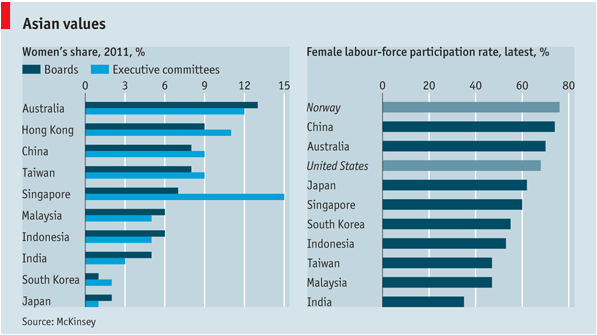
Business.
商業。
Women managers in Asia.
女性高管在亞洲。
Untapped talent.
尚待開發的人才。
Sexism is rife in Asia. That creates an opportunity for non-chauvinist firms.
性別歧視在亞洲"大行其道"。這為非大男子主義至上的企業創造了機遇。
IN THE West, women typically make up 10-20% of upper management and company boards. They are relatively lucky. A report from McKinsey, a consultancy, shows that Asian women lag far behind.
在西方,女性通常占據10-20%的公司高層和董事會職位。相比之下,她們是幸運的。來自麥肯錫咨詢機構(McKinsey)的報告顯示在此方面,亞洲女性大大落后了。
There are exceptions. In Australia women's share of board and executive-committee jobs is roughly on a par with that in America and parts of Europe. Singapore too has a large number of women in senior management (see chart). But elsewhere the picture is mostly dire, and not necessarily because the countries concerned are poor. In Japan and South Korea, both rich, women are about as likely to sit on boards as men are to serve tea.
例外也是有的。在澳大利亞,女性在董事會和執行領導層所占份額與美國和歐洲部分水平一致。新加坡也有大量女性工作在高級經理職位上。但在其他地方,女高管的境地就多半是岌岌可危的了,也不一定,都因為相關國家很窮。在日本和韓國這兩個富裕國家,女子就很可能只是給坐在董事會里的男人們倒茶端水,而不是一起議事。
One reason why so few women in Asia get plum jobs is that in most countries far fewer of them are in the workforce than in the West, where their labour-force participation rate is usually around 60-70%. In India only about one woman in three has a formal job, though millions sweat on farms and in family businesses. Education is unequal, too. In 2009-10 only 10-15% of students entering the elite Indian Institutes of Management were female. But even in Asian countries where plenty of women leap from college onto the corporate ladder, they do not climb as high as men.
很少有亞細亞女性會得到稱心如意的工作,一個原因是多數亞洲國家里,在職場中僅有極少數的女子,而在西方女性參與勞動(工作)率一般大致在60-70%。在印度,三個女子中大約只有一個有正式工作,雖然有數百萬的女性在農場和家庭事務上揮灑汗水。教育也是不平等的。09到10年度,進入印度精英管理學院的學生中僅有10-15%是女性。但即使是在那些有眾多女性能從大學走上職業之路的國家,她們也沒攀登到男性所能達到的高度。
The most common reasons given are much the same as in Europe: the double burden of work and domestic responsibilities; the requirement in many senior jobs to be always available and free to travel; women's reluctance to blow their own trumpet; and the scarcity of female role models. In Asia, an additional hurdle is the lack of public services to support families, such as child care.
與在歐洲一樣,最為普遍也是肯定的原因是:職場與家庭責任的雙重重擔;高管職位隨時隨地的出差要求(受家庭牽連,女性做不到這點);女性對自賣自夸的不情愿;以及女性榜樣的稀缺。而在亞洲,另一個障礙是缺乏諸如孩童看護(Child Care)一類的,援助家庭的公共服務。
So is it just a question of waiting until Asia catches up with the West? The McKinsey report's authors, Claudia Süssmuth-Dyckerhoff, Jin Wang and Josephine Chen, think it is not as simple as that. Having studied 744 large companies and quizzed 1,500 executives in ten Asian countries, they conclude that, unlike their Western counterparts, Asian senior managers are not very interested in the subject. Some 70% of them did not see "gender diversity" as a strategic priority.
所以,這個問題只是:等待亞洲趕上西方的腳步嗎?麥肯錫報告的作者,Claudia Süssmuth-Dyckerhoff,王進(音譯)和喬瑟夫?陳(Josephine Chen),認為問題不是那樣簡單。在研究了774家大公司和問卷調查了1500位來自十個國家的高管,他們總結出,不像西方的同僚,亞洲的高級經理人們對這個話題兵不感興趣。他們中大約70%不認為"性別多樣性"是一項當務之急。
The McKinsey authors think such managers are misguided. They point to companies in Asia that have done well out of recruiting lots of women, such as Shiseido, a Japanese cosmetics company (whose customers are mainly female), and Cisco, an American technology firm which snaps up Asian female talent. It is one of several Western firms that benefit from Asian sexism, in that it is easier to recruit good women when their compatriots ignore them.
麥肯錫報告的作者們認為這些經理人們是錯誤的。他們給出了一些在亞洲從任用女性中獲利,并取得成功的公司,如資生堂(Shiseido),一家日本化妝品公司(它的顧客主要是女性),以及思科(Cisco),一家美國搶奪亞洲女性人才的科技公司。這只是從亞洲性別歧視中獲益的西方公司中的一家,當女性的同胞們都忽略排斥她們的時候,聘用她們就非常容易了。
A study in 2011 by Heidrick & Struggles, a headhunter, found that a third of Asian executives were worried about being able to attract and retain the staff they needed in the next two years. Women could help fill the gap.
一份2011年來自Heidrick & Struggles人才獵頭公司的研究發現有三分之一的亞洲公司高管擔心能否在未來兩年內吸引和維持所需的員工數量。女性有助于填補這個空當。
In a book published last year, "Winning the War for Talent in Emerging Markets", Sylvia Ann Hewlett and Ripa Rashid found that, despite cultural constraints, women in developing countries were increasingly well qualified. Judging by what they told pollsters, they were also more ambitious than Western women, and more loyal to their employers than men.
一本去年出版的書,《在新興市場中贏得人才戰爭》("Winning the War for Talent in Emerging Markets")之中,Sylvia Ann Hewlett 和 Ripa Rashid發現,盡管有文化限制,發展中國家中具有學歷、能勝任的女性們越來越多了。由她們對調查者所言來判斷,她們比西方女性更有抱負,也比男性更忠誠于老板。
Citing studies suggesting that firms with more women at the top perform better, the McKinsey report urges Asian companies to do more to harness female talent. It will be a hard sell, but according to Ms Wang, "Five to ten years might do it."
麥肯錫報告援引了數篇研究,它們都暗示高層有更多女性的企業在市場上表現更好,所以它催促公司們在利用女性人才方面更進一步。這將是個很難有市場的主意,但據王女士的說法,"五到十年也許會有很好的效果。"











